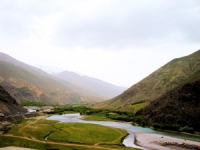Water sharing between Central Asian countries has been conflicting for quite a long time already.
Climate Change Resilience

Climate change issues pose serious threats to the socio-economic development of Afghanistan and Central Asian countries. It is expected that the mean annual temperature in Central Asia will rise 3.7°C by the end of the 21 century[1], leading to rapid glacial retreat, and subsequent water availability decrease. This will seriously threaten the ecological and economic stability, food and human security, and overall regional development of the region.
The most immediate need is to increase resilience of the basin countries through mitigation and adaptation measures which include increasing water use efficiency and improving climate and hydrological data and information. Numerous international and regional organizations have been working on projects that address (or focus) on these particular issues. For example, as a result of the IWRM Project in Ferghana Valley, the water use was reduced by 25-30%. This clearly shows that IWRM can be one of the ways to solve the problem of water scarcity and climate change adaptation. In addition, national hydrometeorological stations are in process of modernization through the projects of World Bank, Swiss Cooperation Agency, UNECE, EC IFAS. Regional coordination to increase data and information sharing is also limited due to lack of trust, lack of capacities, lack of reliable data, and other related issues.
The existing policies of Afghanistan and Central Asian countries include international and national legislations on environmental protection, CDM, energy efficiency, and other adaptation and mitigation programs. However, they consider climatic issues to some extent, and most importantly lack implementation due to lack of awareness, economic incentives, strong capacities.










